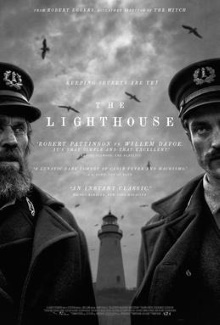This purely black and white film is an amazing exercise in photography and with only two actors, Willem Dafoe and Robert Pattinson, it’s a tour-de-force of acting as well. It was made by the same director, Robert Eggers, who made The Witch. Unfortunately this is one of those films that is so jam-packed with hallucinations, insanity and symbolic references that one never knows how much of what we see is real or whether that even matters, and I tend not to like this kind of film as much.
A young man, Ephraim Winslow, arrives at a remote island to work as an assistant to a more senior lighthouse keeper. At first, he believes that they will share duties across different shifts but the older man Thomas Wake orders him to do all of the most menial and physically demanding jobs. He is also forbidden from ascending to the top of the lighthouse where the lamp itself is located. As the days pass, his behavior becomes increasing erratic as he dreams of mermaids and sea monsters and is annoyed by a persistent seagull. In the evenings, he is soon persuaded by Thomas to get drunk and exchange stories. One the day before his contractual period is supposed to end, he loses his temper and despite being warned against it by Thomas, grabs and kills the annoying seagull. This seemingly causes the wind to change and soon a terrible storm falls upon the island. The next day, with the storm continuing to rage, the two await the arrival of the relief ferry but it never arrives. Ephraim loses his sense of time and perhaps even identity as they get increasingly drunk and he becomes obsessed with getting access to the light at the top of the lighthouse.
Production-wise, this is of course a beautiful work of art based on its visuals alone, rich in textures and detail and all perfectly composed and lit. It’s not just the black-and-white photography, the aspect ratio and harsh lighting are all meant to evoke the 19th-century in which this story takes place. Then there is the florid, archaic dialogue delivered in vintage accents, especially by Dafoe who seems to be having the time of his life here. It’s a little odd to me that he seems well-read enough to quote from poetry and mythology but it certainly works well. Apparently this project started out as an adaptation of an Edgar Allan Poe story but grew to become its own thing. There are also the overt references to Greek mythology and of course the visions of tentacled sea monsters make me think of Lovecraft. Based on aesthetics and atmosphere alone, this is an incredibly fascinating film to watch.
Yet this is the kind of film that essentially has no plot. It’s layer upon layer of allusions, themes, meanings, references and so on. Eggers himself avows that this film is in a way the collected ideas of Carl Jung put on screen. There’s so much going on here: Ephraim’s relationship with Thomas embodies elements of both a daddy complex and latent homoeroticism, their shared obsession with the light is a direct reference to Greek mythology, Ephraim’s later confession of having stolen someone else’s identity brings to fore the question of who anyone really is and so on, all of this forced on the two men due to their shared isolation. With no one else to interact with, it is as if each is constantly trying to dominate the other in many different ways. I’m sure that all this is grist to the mill for audiences who love psychological byplay but this is all too meta and introspective for me and I usually prefer themes that more directly reference day-to-day life.
Anyway, the upshot is that this is a highly artistic film that many critics have praised. For me while I found it to be both beautiful and fascinating, it’s not the kind of film that I love. I much preferred The Witch which despite the overt supernaturalism, is much more grounded and about the society of that time.
